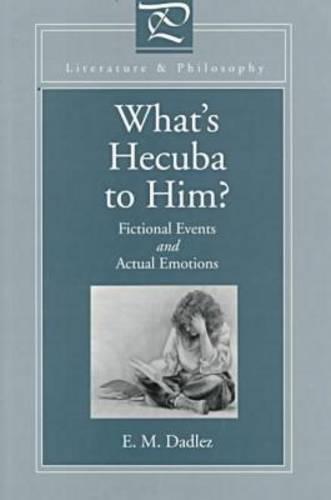Overview
Dadlez offers a clear, precise, and compelling account of why it is rational to have emotions for fictive characters. -Charles Altieri, University of California, BerkeleyFiction transports us. We inhabit new worlds in our imagination, adopt perspectives not our own, and even respond emotionally to persons and events that we know are not real.The very nature of our emotional engagement with fiction, says E. M. Dadlez, attests to the possibility of its moral significance, just as the nature of our imaginative engagement makes us collaborators in the creation of the worlds we imagine.This book engages contemporary debate over the seeming irrationality or inauthenticity of our emotional response to fiction, examining the many positions taken in this debate and arguing that we can understand the relation between cognition and emotion without devaluing our emotional responses to fiction. It takes Hamlet's famous query as the first step in an analytic philosophical inquiry and, by considering some of the answers that derive from that question, arrives at a set of necessary conditions for an emotional response to fiction.What Hamlet's player feels for Hecuba, proposes Dadlez, is no more illusory than what we feel for Hamlet; that the actor weeps for Hecuba reflects both our capacity to envision and understand a seemingly limitless variety of human situations--to empathize with others--and the capacity of fiction to facilitate such understanding. What's Hecuba to Him? is an enticingly written work that opens an entire philosophical arena to literary scholars and illuminates the significance that literature has for our moral life.
Full Product Details
Author: Eva M. Dadlez
Publisher: Pennsylvania State University Press
Imprint: Pennsylvania State University Press
Dimensions:
Width: 15.20cm
, Height: 2.10cm
, Length: 22.90cm
Weight: 0.426kg
ISBN: 9780271016511
ISBN 10: 0271016515
Pages: 252
Publication Date: 15 September 1997
Audience:
College/higher education
,
Professional and scholarly
,
Undergraduate
,
Postgraduate, Research & Scholarly
Format: Paperback
Publisher's Status: Active
Availability: Manufactured on demand

We will order this item for you from a manufactured on demand supplier.
Reviews
Dadlez offers a clear, precise, and compelling account of why it is rational to have emotions for fictive characters. --Charles Altieri, University of California, Berkeley Dadlez offers a clear, precise, and compelling account of why it is rational to have emotions for fictive characters. Charles Altieri, University of California, Berkeley Dadlez offers a clear, precise, and compelling account of why it is rational to have emotions for fictive characters. --Charles Altieri, University of California, Berkeley Dadlez offers a clear, precise, and compelling account of why it is rational to have emotions for fictive characters. Charles Altieri, University of California, Berkeley Dadlez offers a clear, precise, and compelling account of why it is rational to have emotions for fictive characters. Charles Altieri, University of California, Berkeley Dadlez offers a clear, precise, and compelling account of why it is rational to have emotions for fictive characters. --Charles Altieri, University of California, Berkeley
Dadlez offers a clear, precise, and compelling account of why it is rational to have emotions for fictive characters. --Charles Altieri, University of California, Berkeley
<p> Dadlez offers a clear, precise, and compelling account of why it is rational to have emotions for fictive characters. <p>--Charles Altieri, University of California, Berkeley
Dadlez offers a clear, precise, and compelling account of why it is rational to have emotions for fictive characters. --Charles Altieri, University of California, Berkeley
Author Information
E. M. Dadlez is Assistant Professor in the Department of Humanities and Philosophy at the University of Central Oklahoma.




